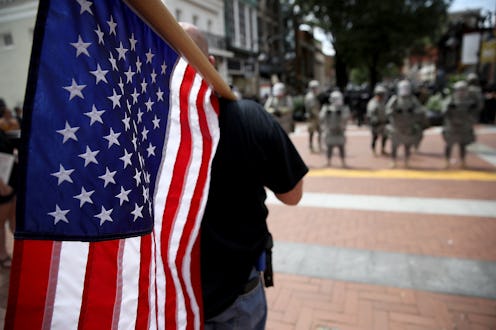News
This Is The Wrong Response To Charlottesville

On Saturday, clashes between white nationalists and anti-racist counter-protesters came to a head when a car sped into a crowd of pedestrians there to protest white supremacists in Charlottesville, Virginia. One woman, 32-year-old Heather Heyer, died, and at least 19 were wounded as a result of the attack, and while public figures across the country have denounced the violence in its aftermath, many responses to the Charlottesville attack are missing an important point. As a politically-motivated attack on innocent civilians, Saturday's incident fits the definition of terrorism — but no major figure has brought it up.
White supremacist groups including the Ku Klux Klan and neo-Nazis gathered in Charlottesville this weekend to protest the city's decision to take down a statue of Confederate general Robert E. Lee. The "Unite the Right" rally was marked by violent outbreaks between the far-right protesters and crowds of anti-racism counter-protesters. According to the Los Angeles Times, many of the protesters carried "shields, weapons and Nazi and Confederate battle flags." After the rally thinned out, a sports car rammed into a crowd of largely counter-protesters, killing a woman who was crossing the street.
In a television statement, Virginia Gov. Terry McAuliffe spoke out against the white supremacists involved in the rally. "Go home," he said. "You are not wanted in this great commonwealth." Similarly, Hillary Clinton called out white supremacists for the "incitement of hatred that got us here."
Meanwhile, President Trump avoided pointing the finger at the alt-right, which happens to make up much of his dwindling fan base. In a press conference, he rejected "in the strongest possible terms this egregious display of hatred, bigotry and violence on many sides."
Trump's weak response may not come as much of a surprise. What all the responses have in common, however, is their avoidance of the word "terrorism," despite the eagerness with which people have used it following public acts of violence in the past. The London Bridge terror attack, for instance, was remarkably similar: a car driven into a crowd of pedestrians with the intent to kill. On Sunday, CNN reported that a 20-year-old Ohio man was taken into custody on suspicion of "second-degree murder, malicious wounding, and failure to stop in an accident that resulted in death." Sound familiar?
In 2015, NPR ran an article about the struggle to define terrorism, and a political science professor offered up the following description:
At least among political scientists there is a well-worn definition for terrorism: an attack against a "non-combatant target" for political purposes that is intended to affect an audience larger than the immediate victims.
Let's review: The attack in Charlottesville targeted counter-protesters, who are non-combatants. The motives have yet to be officially determined, but it took place at a rally to celebrate white supremacist ideals. You'd think that this would be enough to at least suggest a terror attack, especially considering how often the term is used when an attack involves people of color.
Ultimately, the decision to treat an incident as terrorism is up to law enforcement. However, the language we use to describe white supremacist acts speaks volumes about the difference in the way extremist groups are viewed in the United States. Just like people, all hatred is created equal — and those who perpetrate it deserve the same condemnation.